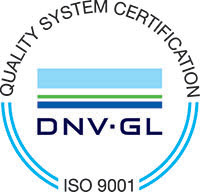In basic terms, the object to be electropolished is immersed in an electrolyte (typically phosphoric and sulphuric acid) and subjected to a direct electrical current. The object is maintained anodic, with the cathodic connection being made to a nearby metal conductor (see diagram below). In electropolishing, the metal is removed ion by ion from the surface of the metal object being polished.
During electropolishing, the polarized surface film is subjected to the combined effects of gassing (oxygen), which occurs with electrochemical metal removal, saturation of the surface with dissolved metal and the agitation and temperature of the electrolyte. Electropolishing selectively removes microscopic high points or "peaks" faster than the rate of attack on the corresponding micro-depressions or "valleys." (See diagram below)
Typical Electropolishing Setup


Surface Profile Before Electropolishing

Surface Profile After Electropolishing
 Delstar
Delstar
